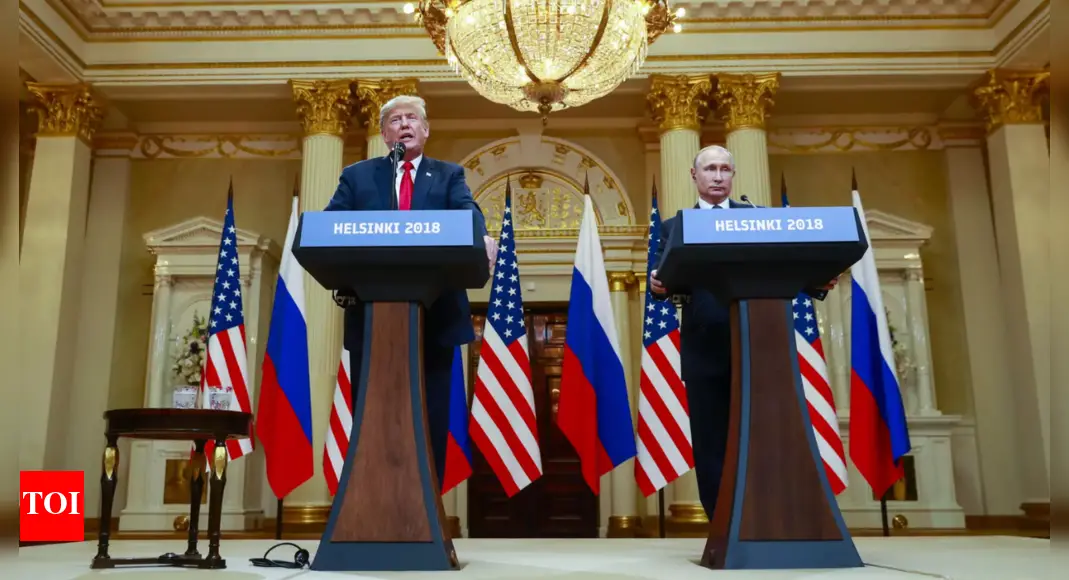US-Russia Talks: The Upcoming Meeting Between Donald Trump and Vladimir Putin
In the fluid landscape of international relations, few interactions stir up as much attention and conjecture as the meetings between world leaders. The world is currently abuzz with news that former President Donald Trump and Russian President Vladimir Putin are scheduled to meet next week. While there are numerous angles to explore, the discourse surrounding these talks inevitably intertwines with the ongoing conflict in Ukraine and the broader implications for international relations.
Background Context
Donald Trump’s presidency was marked by an often tumultuous relationship with Vladimir Putin. From moments of camaraderie to heated debates over issues like election interference, the dynamics between the U.S. and Russia have been anything but straightforward. As we look ahead to their upcoming meeting, it’s essential to reflect on the context that brought us here and the potential ramifications of their discussions.
Since the onset of the Ukraine crisis in 2014, relations between the U.S. and Russia have considerably deteriorated. Economic sanctions, military confrontations, and a war of words have defined this period, raising the stakes for any U.S.-Russia talks. The Kremlin has remained largely silent about the situation in Ukraine, which adds an element of unpredictability to these discussions. As they approach the negotiating table, both leaders stand at a pivotal crossroads; their decisions here could influence not only their respective countries but also the international order as a whole.
The Stakes Involved
When Trump and Putin meet, the stakes will be high. For Trump, a vocal critic of the current administration’s handling of foreign policy, this is an opportunity to reassert his role on the international stage. His supporters might see this meeting as a chance for him to demonstrate a stronger, more direct approach toward dealing with complex global issues.
Conversely, for Putin, this meeting is a chance to shape the narrative surrounding Russia’s role on the world stage, especially amid ongoing accusations of aggression in Ukraine. The Kremlin may use this meeting not only to strengthen its diplomatic ties with the U.S. but also to send a message to Europe and NATO allies that Russia cannot be sidelined in discussions of global importance.
A Diplomatic Dance
The art of diplomacy often resembles a carefully choreographed dance, with each move made to elicit a response from the other. In this case, both leaders have made their intentions clear, but the underlying motivations may differ greatly. Trump, while advocating for America First policies during his tenure, expressed an urgent need for dialogue: “We can’t start a new Cold War.” It’s a sentiment that resonates with many Americans eager for a less confrontational relationship with nuclear powers.
Meanwhile, Putin continues to leverage both strength and subtlety, seeking to position Russia as a key player in global affairs. The Kremlin’s silence on the Ukraine situation raises questions about their strategy. Will they adopt a defensive posture at the talks, or will they push back against perceptions of Russia as the aggressor? It remains to be seen how this will unfold, but the stakes are undeniably high for both men.
Public Sentiment
Public sentiment surrounding U.S.-Russia relations is complex. On one hand, many Americans are skeptical about engaging with Russia due to its actions in Ukraine and questions of electoral interference. Yet, there is also a significant portion of the populace that understands the importance of diplomacy in resolving conflicts. It’s a delicate balancing act. Engaging Putin allows for the possibility of compromise and progress, while distancing from him can serve to reinforce a narrative of strength and moral clarity.
Polling data suggests that Americans are divided on the effectiveness of Trump’s previous approaches to Russia. Some view his willingness to engage in talks as a breath of fresh air in a world often characterized by saber-rattling, while others remain wary of his seemingly cordial demeanor towards Putin. This upcoming meeting will serve as a litmus test not only for Trump’s foreign policy but for the U.S. electorate’s willingness to engage in dialogue with rivals.
The Broader Implications
The world is watching this upcoming meeting not just with curiosity but with a sense of urgency. Global stability hinges on how nations react to one another, and a meeting between the leaders of two superpowers has implications that extend far beyond their properties. The trajectories of NATO, European security, and even UN policy could be influenced by the outcomes of their discussions.
Consider the way in which economic sanctions against Russia have affected global trade patterns. If Trump and Putin can find common ground, there could be a ripple effect throughout international markets, perhaps even providing a basis for easing tensions in the global economy. Conversely, if the dialogue devolves into further accusations and posturing, we might see an escalation in both military readiness and economic sanctions.
Personal Reflections
As I reflect on the implications of the upcoming meeting, I can’t help but feel a mix of hope and apprehension. History tells us that moments like these can lead to significant breakthroughs or, conversely, deeper entrenchment in conflict. I recall the summits between Reagan and Gorbachev, which transformed the trajectory of U.S.-Soviet relations; the power of dialogue should never be underestimated.
Yet, I also remember the tension and friction that characterized various Cold War interactions, a stark reminder that diplomacy can be a double-edged sword. The success of Trump and Putin’s meeting will largely depend on their willingness to listen and negotiate solutions rather than merely affirm their positions.
Moving Forward
Whatever the outcome, one thing is certain: global politics is a constantly evolving tapestry, woven with the threads of history, ideology, and personal relationships. As Trump and Putin prepare for their meeting, we must remain vigilant observers, paying attention to the nuances that emerge in their discussions. The world is watching, and the implications of their words and actions will reverberate long after their meeting concludes.
In conclusion, the upcoming discussions between Donald Trump and Vladimir Putin hold the potential to alter the landscape of U.S.-Russia relations amid a backdrop of ongoing tension in Ukraine. It’s an uncertain time, and while the stakes are undeniably high, the foundation for progress is built upon the willingness to engage, communicate, and ultimately strive for understanding. As we anticipate their meeting, let us hope for discussions that foster peace, cooperation, and a recognition of our shared humanity—essential elements for addressing the complexities of our modern world.




